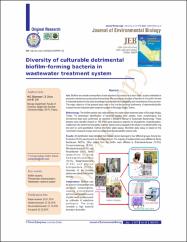Diversity of culturable detrimental biofilm-forming bacteria in wastewater treatment system
Abstract
Aim: Biofilms are sessile communities of cells attached to a surface or to each other, usually embedded in polymeric substances produced by the bacteria. The community structure of bacteria in the biofilm formed in industrial systems is the basic knowledge to understand the complexity and mechanisms of biocorrosion. The major objective of the present study was to find out the bacterial biodiversity of detrimental biofilm masses from an industrial water treatment system in Koycegiz-Mugla, Turkey. Methodology: The biofilm sample was collected from the waste water treatment plant of Koycegiz-Mugla, Turkey. For phenotypic identification of bacterial isolates from sample, basic morphological and biochemical tests were performed, as reported in Bergey's Manual of Systematic Bacteriology. These bacteria were identified based on 16S rRNA gene sequence analysis for phylogenetic characterization. Additionally, the biofilm-forming ability of all the strains were evaluated in the study by modified biofilm ring test and by semi-quantitative method (microtiter plate assay). Microtiter plate assay is based on the colorimetric measure of a dye such as crystal violet incorporated by sessile cells. Results: All identification tests indicated that nineteen strains belonged to four different groups. Among four firmicutes (74.0%) were found to be dominant phylum. The majority of isolated strains were affiliated to family Bacillaceae (69.5%). Other strains from the biofilm were affiliated to Enterobacteriaceae (10.5%), Comamonadaceae (5.0%), Microbacteriaceae (5.0%) and Nocardiaceae (5.0%), family respectively in Group Gammaproteobacteria (10.5%), Betaproteobacteria (5.0%) and phylum Actinobacteria (10.5%). Generally, all the nineteen strains were able to form biofilm strongly. Interpretation: Biofilms may be a source of recalcitrant and xenobiotic contaminations, causing environmental detriment and possible source of public health problems such as outbreaks of waterborne pathogens. The study revealed a high bacterial diversity in the biofilm.


















